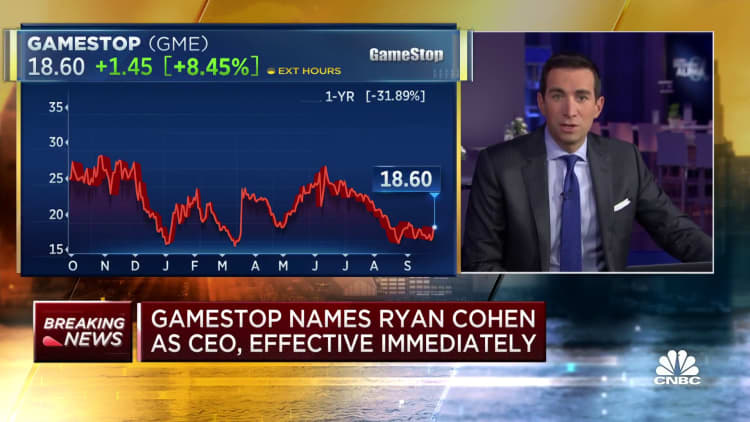
GameStop said Thursday morning that billionaire activist investor Ryan Cohen would take over as the video game retailer’s chief executive, chairman and president effective immediately — and he won’t be collecting a salary.
Shares of the company jumped more than 6% in premarket trading following the announcement.
GameStop’s board, with Cohen abstaining, unanimously voted to appoint the entrepreneur as the retailer’s top executive on Wednesday. Cohen had previously held the title of executive chairman but will step down from the role upon his latest appointment, according to a securities filing.
Cohen won’t “receive any compensation” for his work, a news release said.
The move comes more than three months after GameStop fired CEO Matthew Furlong, made Cohen executive chairman and appointed longtime company soldier Mark Robinson as its “principal executive officer” and general manager. GameStop didn’t give a reason for Furlong’s dismissal at the time, but it came just months after the company had reported its first quarterly profit in two years with Furlong at the helm.
Several weeks later, the company announced that CFO Diana Saadeh-Jajeh was resigning.
GameStop Chairman Ryan Cohen.
Source: CNBC
With the latest move, Cohen will also assume the role of principal executive officer from Robinson. He previously served as general counsel and secretary, and he added principal executive officer to his list of duties back in June. Now, he will resume as just general counsel and secretary, according to a securities filing.
Cohen, who founded pet food retailer Chewy and has become known as the “king” of meme stocks, bought a stake in GameStop in 2020 and joined the board in 2021 – during the height of the meme phenomenon.
As of late June, his firm RC Ventures was GameStop’s largest shareholder with a 12.09% stake, according to FactSet.
Since Cohen joined the company, the business hasn’t shown many signs of a turnaround, albeit with some exceptions. Earlier this month, GameStop reported its second-quarter financial results, posting a narrower loss than it did a year ago, as well as a slight increase in revenue.
